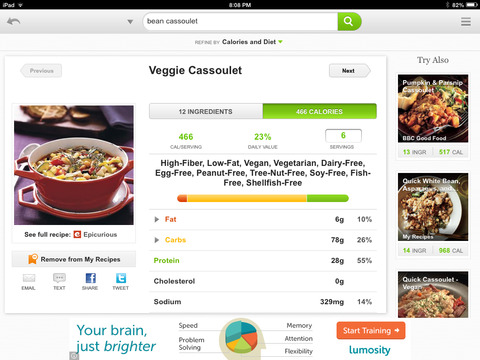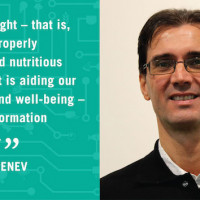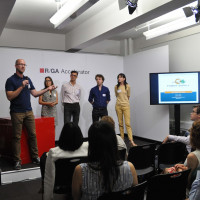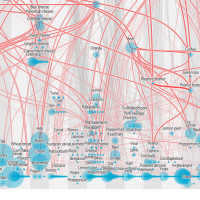Millions of recipes are just a few taps away, but the accompanying nutrition information, which consumers are increasingly seeking, isn’t always as easy to find. Edamam wants to solve this problem. The two year old data startup aims to capture the world’s food knowledge and use it to help people make informed food decisions.
Edamam has built a semantic food technology platform, which generates real time nutritional analysis of 1.5 million recipes from five hundred popular websites. Leveraging primarily USDA data, the platform categorizes information by thirty attributes, including nutrition information, allergies, cooking time, recipe complexity and more.
The startup offers a suite of nutrition data products built on top of its technology platform. It has an API for developers to leverage, a real time recipe analysis service called Nutrition Wizard ($2.95 a month), a recipe finder website and free iOS and Android apps. Additionally, it recently launched Nutrition Wizard Plus ($5.95 a month), a servicee for nutritionists and restaurants that allows users to export nutrition data and save and print recipes. But its bread and butter is working with big companies, like Epicurious, Gannett, Random House, Nestle and (recently) Samsung, to implement custom nutrition analysis solutions.
I caught up with founder and CEO Victor Penev by email to learn more about Edamam’s business model, challenges and next steps. Our interview has be edited slightly for brevity and clarity.
_____________
Food+Tech Connect: How does your platform work and where do you get your nutrition data from?
Victor Penev: We use natural language processing and proprietary algorithms to do real-time nutrition analysis of any recipe or ingredient list. The key is to produce highly accurate analysis, which requires precision in extracting and processing data from unstructured text We don’t have drop downs and clumsy selections of foods – we simply take the information in a way people speak about food and analyze it.
The underlying nutrient data comes from the USDA open source database, but we have added to it and enhanced it as we have worked on our technology. We combine several databases, but a key differentiator is not the underlying data, but our ability to produce highly accurate nutritional analysis on the fly.
FTC: What is your business model, and how has it shifted since you started the company in 2012?
VP: We are a Business-to-Business (B2B) company and we sell Data-as-a-Service solutions to businesses. For large clients, we do custom licensing and implementation.
Edamam started as a Business-to-Consumer (B2C) company, and we do have mobile apps and website which are very highly rated by users. However, we found strong enough interest from businesses and decided to switch direction at the end of last year. Our focus is on large companies that can most benefit from our cost-effective, scalable, real-time nutrition solutions.
The solutions fall into two main categories: diet driven recipe recommendations and search, and real time nutrition analysis, which is provided as an API, i.e. clients send us data, which we analyze in real time and send back the analyzed nutrition information.
FTC: What are your major challenges as a B2B data startup?
VP: As with any B2B business, the primary challenge is streamlining the sales process to scale the business. Large customers usually mean very long sales cycles, while smaller customers are not as profitable. So, our challenge is to find the focus and balance and multiply our sales.
We now have standard products and pricing, and we aim to streamline those for a few verticals where we see the most interest in our solutions.
FTC: How was you experience taking part in StartUp Health? What were your key lessons learned?
VP: I cannot say enough good things about StartUp Health. It is an unusual program, as you stay with it for 3 years. The amount of support and guidance a company can receive there is unbelievable. But most importantly, you get to meet many more entrepreneurs who have adjacent businesses or simply have great lessons from the trenches to share.
Lesson number one is that a long-term program, which is unlike a typical accelerator creates a lot of value for participating start-ups. Lesson number two is that the health/healthcare market is huge but very hard to sell into, so one needs as many resources and help as possible. Lesson three is that nutrition is going to be big not only in the food space, but in the health space and the challenge is to prioritize all opportunities.
FTC: What’s next for Edamam? Do you have any exciting partnerships, features or projects on the horizon?
VP: We look forward to powering nutrition for recipes for the New York Times. In addition, we are in various stages of discussion with WeightWatchers, WebMD, Rodale, Microsoft, Scripps (Food Network), Jawbone, Walmart, Peapod and Disney, as well as a number of smaller companies.
FTC: What advice do you have for burgeoning food tech and health tech startups?
VP: All you need is passion and patience. The way people grow, buy, cook and eat food is going to dramatically change in the next 50 years, and I wish good luck to all who dare to make this happen.






